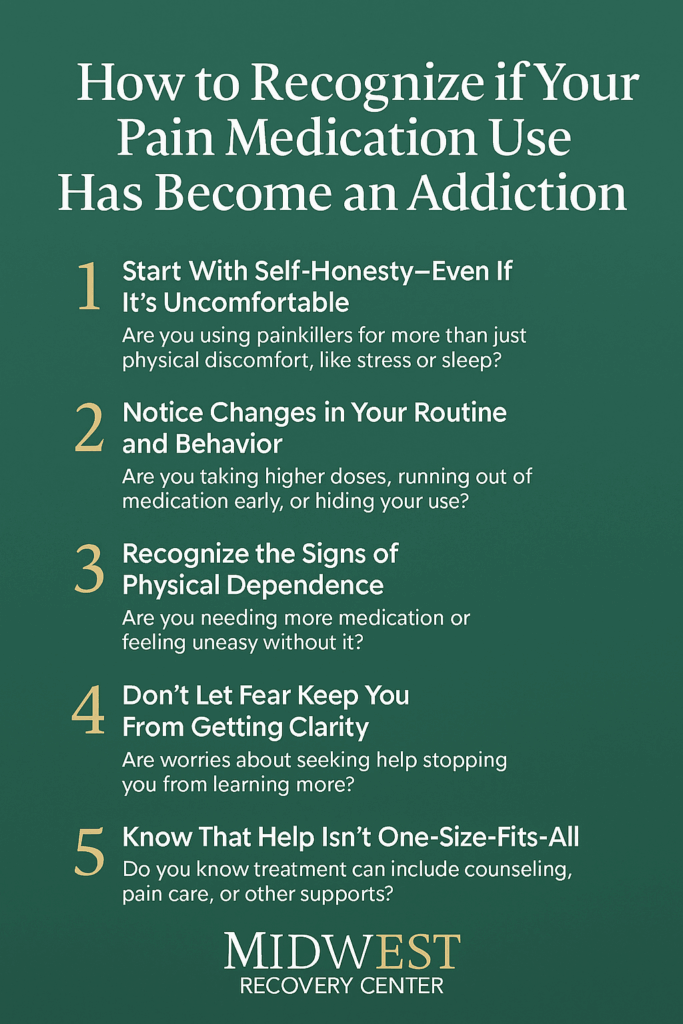If you’re taking prescription painkillers and starting to worry it’s more than just “as needed,” you’re not alone—and you’re not overreacting. Pain is complex. So is relief. And when the relief starts to feel like a need, not a choice, it’s okay to ask questions. It’s smart to.
At Midwest Recovery Center in Toledo, Ohio, we help people untangle the line between pain management and painkiller addiction every day. As an addiction counselor, I’ve worked with many clients who felt overwhelmed and unsure—especially after being newly diagnosed and prescribed strong medication. You’re not weak for asking, “Is this too much?” You’re wise.
Let’s break this down in a way that’s clear, calm, and useful—so you can understand what’s happening and decide what’s next.
1. Start With Self-Honesty—Even If It’s Uncomfortable
Start by checking in with yourself. Are you still taking your pain meds only when absolutely necessary? Or have you begun using them to manage more than just physical discomfort?
Painkillers, especially opioids, can ease emotional pain just as easily as physical. If you notice yourself taking them after a stressful day, to help you fall asleep, or simply to “feel better,” it might be time to pause and reflect.
Common emotional triggers for overuse include:
- High stress or anxiety
- Trouble sleeping
- Feeling overwhelmed or emotionally numb
You may not recognize these patterns right away. That’s okay. The goal here isn’t self-judgment—it’s self-awareness.
2. Notice Changes in Your Routine and Behavior
Changes in how you live your daily life can be subtle, but telling. Addiction often creeps in through routine.
Here are some behavior shifts to watch for:
- Taking higher doses than prescribed or more frequently
- Running out of medication before your refill
- Visiting multiple doctors or pharmacies to get more pills
- Isolating yourself from loved ones or hiding your medication use
If your life has started to revolve around keeping up with your prescription, or if you’re thinking about your medication more than you’d like to admit, these may be early signs of a growing problem.
Remember: these signs aren’t about shame. They’re about safety.
3. Recognize the Signs of Physical Dependence
Dependence doesn’t mean you’re a bad person or that you’ve done something wrong. It simply means your body has adapted to the medication.
You might be physically dependent if:
- You feel jittery, anxious, or sick when you skip a dose
- You need higher doses to get the same level of pain relief
- You use your medication to feel normal rather than to manage pain
These signs indicate a physical reliance that can quickly escalate into addiction if left unchecked. But they’re also signs that your body needs support.
At Midwest Recovery Center, we recognize the difference between dependence and addiction—and we help you treat both, with compassion and respect.
4. Don’t Let Fear Keep You From Getting Clarity
One of the most heartbreaking parts of addiction is how fear can keep people from reaching out. Fear of being judged. Fear of losing access to pain relief. Fear of what treatment might mean.
But seeking help doesn’t mean you have to quit everything cold turkey or go into inpatient rehab tomorrow. It simply means you want to understand your relationship with painkillers better.
Our team at Midwest Recovery Center works with you to create a plan that matches your needs. That might include:
- Medical detox
- Outpatient painkiller addiction treatment
- Therapy for pain management and emotional support
- Alternative pain relief methods
You deserve care that sees you as a whole person—not just a diagnosis.
5. Know That Help Isn’t One-Size-Fits-All
Treatment for painkiller addiction is not a one-size-fits-all solution. And it shouldn’t be. Your story, your pain, your goals—they matter.
In Toledo and the surrounding area, Midwest Recovery Center offers flexible treatment options that include:
- Individual therapy focused on the emotional roots of substance use
- Group support to connect with others navigating similar struggles
- Medication-assisted treatment (MAT) when appropriate, to ease withdrawal and support recovery
- Chronic pain management strategies that don’t rely solely on pills
Many people start treatment still using medication. That’s okay. You don’t have to be “ready to quit everything” to begin healing. You just need to be ready to explore what health could look like—on your terms.
📍 Looking for support near you? Learn more about our painkiller addiction treatment program in Ohio.
Frequently Asked Questions About Painkiller Use and Addiction
What’s the difference between dependence and addiction?
Dependence means your body has adapted to a substance and needs it to function normally. Addiction involves both physical and psychological cravings that interfere with daily life, behavior, and relationships.
Can I seek help even if I still have legitimate pain?
Absolutely. Many people who need pain management also need help setting safe boundaries around medication use. Our team can help you navigate both without judgment.
Do I have to stop taking my medication to get help?
Not necessarily. Many treatment plans support tapering gradually or using alternatives before stopping entirely. What matters most is having a plan that supports your safety and well-being.
How do I know if treatment is right for me?
If you’re thinking about this question, it might be time to talk to someone. A brief consultation with our team can help you assess where you are and what kind of support could help.
What kinds of treatment are available at Midwest Recovery Center?
We offer a full range of outpatient services in Toledo, including therapy, support groups, medication-assisted treatment, and chronic pain support—all tailored to your needs.
Ready to Take the Next Step?
It’s okay to feel uncertain. But you don’t have to stay stuck in that space. Whether you’re just noticing some early signs or you know it’s time to make a change, Midwest Recovery Center is here to walk with you.
📞 Call us at (833) 657-0858.
Let’s talk through what’s going on and what support could look like—on your terms.









